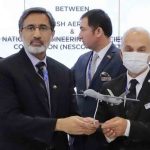For Pakistan to have a competitive defense industry that will promise efficiency, quality and cost control, the private sector needs to be facilitated in the aerospace sector.
Former special advisor to the defense committee of the house of commons, professor emeritus Keith Hartley – an expert on defense and aerospace economics – shared these views while addressing an online webinar on ‘Defense Economics and the Aerospace Industry’. The webinar was organized by the Pakistan Institute of Development Economics (PIDE).
Elaborating the professor said, “With private enterprise, we will have private capital markets and the private capital markets have a threat of bankruptcy. This threat works as an incentive for efficient and least costly technology-intensive solutions and that is what Pakistani politicians, economists, and military establishment need to sort out. Trade-offs will be there. There is no doubt that selling a jet fighter is more economically viable than selling wheat as aircraft sail brings with it a prolonged relationship, political power and of course spin-offs and spill overs.”
“But we, as economists, have to be able to identify the range of choices available and select the nest possible one.” Prof. Hartley, discussed defense economic, its scope, definition and content. He also shed light on the contributions economists have made to the area of defense. “There has been a misconception that economists have limited themselves to defense expenditures only, the area warrants a closer look and the many avenues of research that it offers should be exploited by researchers to lead to inform defense formulation, “He said.’
Also Read: Pakistan, Turkey collaborating on a fifth-generation fighter jet, TF-X
“The final output , new solutions, and competitions are the three principles that need to be understood”, prof. Hartley pointed out, adding “it is the final output that matter.” These include peace, deterrence, protection, and technology spinoffs and spillovers.
“For instance, in Pakistan, there has always been the debate that the defense sector takes away the bulk of resources, but if we look at it, not from the input-cost perspective. As most economists have done rather from the final outputs monetary and non monetary evaluations, only then can we assess the rationality and bring empirics regarding the development – defense tradeoffs.
He did agree that tradeoffs are always there and defense planners – whether in Pakistan or any other country will have to face challenging decisions in the future.
Also Read: China will build a space centre and more satellites for Pakistan
![]()





